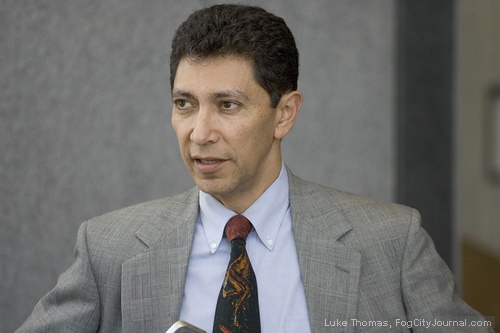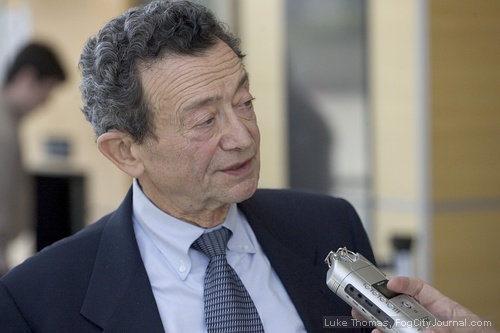
By John F. Hoctor
May 1, 2008
Alarming rates of suicide compared to previous U.S. military conflicts have united veterans of Iraq and Afghanistan in a declaration of war on their own soil against the U.S. Department of Veterans Affairs.
Closing arguments in the first national class-action lawsuit filed against the VA by veterans of the Iraq and Afghanistan conflicts, were presented yesterday in Federal court in San Francisco.
The lawsuit, known as Veterans for Common Sense v. Peake, accuses the VA of systematically denying veterans desperately needed medical treatment, leading to an “epidemic of suicides,” and long delays in treatment for traumatic brain injury, post traumatic stress disorder (PTSD) and other “invisible wounds.”
“The suicide problem is out of control,” said Gordon Erspamer, lead attorney with Morrison & Foerster who is representing Veterans for Common Sense and Veterans United for Truth in a national class-action lawsuit against the VA.
“Our veterans deserve better,” Erspamer said. “There are waiting lists to see a doctor that usually go for at least a month. If you’re suicidal, you can’t wait a month. You can’t wait three months. People placed on waiting lists have killed themselves. It’s a documented fact.”

Plaintiffs’ Attorney Gordon Erspamer
Paul Sullivan, Executive Director for Veterans for Common Sense, who testified at the trial said, “The 12,000 attempted suicides per year shows clearly, without a doubt, that there is an epidemic of suicide among veterans.”
Veterans Wait-Listed for Months or Years
But Erspamer noted that veterans aren’t only being wait-listed for medical treatment for psychological trauma and other “invisible” wounds, but run the gamut of severe injuries.
“We’re dealing with people who are almost totally disabled. People who have lost arms, lost legs in these wars, people who have come home with Post Traumatic Stress Disorder or physical brain injury. We can’t have these people waiting for months and years for the treatment they need,” Erspamer said.
Erspamer said the VA has arbitrarily denied coverage to thousands of vets, that it takes nearly a year to decide whether it will provide coverage to veterans suffering from PTSD, and takes as long as four years to address veterans’ appeals cases.
“The system is in crisis and unfortunately the VA is in denial,” Erspamer exclaimed within the marble and walnut lined Federal courtroom, urging U.S. District Court Judge Samuel Conti to appoint a special master to oversee the troubled agency.
The veterans’ groups are also seeking a judge’s order forbidding the VA from turning away any veteran who shows up at a facility seeking mental health care.
Lawsuit Seek Immediate Treatment for Vets in Need
The lawsuit seeks Conti to issue a preliminary injunction to force the VA to immediately treat veterans who are at risk of suicide, or show signs of PTSD, and to overhaul internal systems that handles benefits claims. The lawsuit alleges that numerous VA practices stemming from a 1998 law violate the constitutional and statutory rights of veterans suffering from PTSD by denying veterans mandated medical care.
The two veterans groups suing the VA want Conti to order the agency to dramatically improve how fast it processes applications and how it delivers mental health care, especially when it comes to preventing suicides and treating PTSD. They state that the case is not about damage compensation.
Bush Administration Says Vets’ Class Action Is Illegal
Notably, the Bush Administration, elected for two terms in part for a “Support Our Troops” platform, has repeatedly tried to have the veterans’ suit dismissed, arguing that the groups lacked standing because they were associations, not individual veterans. The administration went so far as to argue that the entire notion of a veterans’ class-action lawsuit is illegal, claiming that veterans are required to petition individually.
Justice Department attorneys argued in court papers filed in March 2008 that Iraq and Afghanistan veterans were not “entitled” to the five-years of free healthcare upon their return from combat as mandated by Congress in the “Dignity for Wounded Warriors Act.”
Rather, the VA argued, medical treatment for war veterans was discretionary based on the level of funding available in the VA’s budget.
Multiple times during his opening statement, Justice Department lawyer Richard Lepley categorized the veterans’ groups as “special interests” and argued the changes they seek in their lawsuit – better and faster mental health care, and more rights for veterans appealing denials of benefits – are beyond the judge’s authority.
“You have no standards to judge,” Lepley told Conti. “This court shouldn’t be trying to be a substitute for what the medical professionals at the VA decide.”
But during trial, Dr. Gerald Cross, Principal Deputy Under Secretary for Health at the Veterans Health Administration, said veterans of Iraq and Afghanistan were not only entitled to free healthcare, but added, “There is no co-pay.”
Conti Rules for Due Process
During the trial, Conti, a World War II veteran himelf, dismissed the government’s claims.
“It is within the court’s power to insist that veterans be granted a level of due process that is commensurate with the adjudication procedures with which they are confronted,” Conti wrote in a January ruling.
Arguments in the first national class-action lawsuit brought on behalf of Iraq and Afghanistan war vets accused top government officials of deliberately deceiving veterans and the American public about the actual risk of suicide among vets. Government documents produced as evidence during the trial back up the allegations.
“Shh” Email: 1,000 Suicide Attempts per Month, 18 Suicides per Day
On April 21, the first day of trial, the now-infamous VA internal December 2007 email written by Dr. Ira Katz, the VA’s mental health director, was submitted as evidence. The email states that 12,000 veterans per year under VA care were attempting suicide. Widely circulated within the VA, the email, titled “Not for the CBS News Interview Request” told a tragic tale.
“Our suicide prevention coordinators are identifying about 1,000 suicide attempts per month among the veterans we see in our medical facilities,” Katz wrote. The email concludes: “Is this something we should (carefully) address ourselves in some sort of release before someone stumbles on it?”
In November Katz told CBS, “There is no epidemic in suicide in VA,” and that there were only 790 attempted suicides in all of 2007, a fraction of Katz’s estimate stated in the internal email. In the same email Katz wrote there “are about 18-suicides per day among America’s 25 million veterans.”
Senator Calls for Katz’ Dismissal
“The suicide rate is a red-alarm bell to all of us,” said Sen. Patty Murray (D-Wash). Murray said the VA’s mental health programs are being overwhelmed by Iraq and Afghanistan war veterans, even as the department tries to downplay the situation.
“I think we ought to be worried,” Murray said, adding that, as with Vietnam-era vets, some of the more violent symptoms might not show up for 50-years.
“They can be walking time bombs for decades,” Murray said. “I hope everyone in the VA understands this.”
Murray said the VA has lied about the number of veterans who’ve attempted suicide and has demonstrated a pattern of misleading Congress about the increasing number of soldiers who served in Iraq and Afghanistan who are now seeking help and straining Defense Department and VA facilities and programs.
Murray said she’s spoken with VA Secretary James Peake and demanded that he fire the man in charge of the department’s mental health programs: Dr. Ira Katz. The Denator said Peake has yet to respond to her request.
In a Feb. 5, 2008, letter, Peake told Congress that 144 Iraq and Afghanistan combat veterans committed suicide between October 2001 and December 2005.
Bob Filner (D-CA), House Chairman of Veterans Affairs, flatly called the situation a national disgrace.
In an April 22, 2008, letter Sen. Daniel K. Akaka (D-Hawaii), chairman of the Senate Veterans’ Affairs Committee called for the resignation of Dr. Ira Katz from his post as the chief mental health officer at the Department of Veterans Affairs.
“Dr. Katz’s personal conduct and professional judgment have been called into question,” Akaka wrote. “I believe veterans, and the Department of Veterans Affairs, would be best served by his immediate resignation.”
Senator Hillary Clinton stumping last week in Ft Wayne, Indiana, weighed in on the VA controversy sweeping Washington, with observations that recall her generations’ battles with Vietnam vets.
“They are generally neglected, as in Walter Reed,” Clinton said. “Vets ask, ‘Where do I go to get my brain back?'”
Clinton pointed out that traumatic brain injury funds were cut in Bush’s latest budget. She said that the government has a duty to give service back to the vets after their service and sacrifice.
“We have the greatest military in the world but force is a last resort not a first resort,” Clinton said.
RAND Corporation Study
A recent RAND Corporation study strongly suggests that suicide and suicide attempts, traumatic brain injury, PTSD, and the psychological toll on the troops in Iraq and Afganistan, many involving multiple rotations, is disproportionately high compared with the physical injuries of combat.
Since the September 11, 2001, attacks on New York City and Washington, approximately 1.7 million U.S. troops have been deployed for Operation Enduring Freedom and Iraqi Freedom (OEF/OIF) in Afghanistan and Iraq. In the face of mounting public concern over post-deployment health care issues confronting OEF/OIF veterans, several task forces, independent review groups, and a Presidential Commission, have been convened to examine the care of the war-wounded and make recommendations.
Concerns have been most recently centered on two combat-related injuries in particular: PTSD and traumatic brain injury. With the increasing incidence among returning veterans, concern about depression is also on the rise.
The RAND Corporation’s study said approximately 300,000 U.S. troops sent into combat in Iraq and Afghanistan are suffering from major depression and PTSD, and 320,000 have received traumatic brain injuries.
“There is a major health crisis facing those men and women who have served our nation in Iraq and Afghanistan,” said Terri Tanielian, a researcher at RAND who worked on the study. “Unless they receive appropriate and effective care for these mental health conditions, there will be long-term consequences for them and for the nation. Unfortunately, we found there are many barriers preventing them from getting the high-quality treatment they need.”
Vets Need Treatment Presumption
“Seeking help from the Department of Veterans Affairs involves a two-track system,” according to the veterans’ complaint filed before the court. “A veteran will go to the Veterans Health Administration for diagnosis and medical care, and a veteran goes to the Veterans Benefits Administration to apply for service-connection and disability compensation.”
The brief states: “The VA is failing these veterans as they move along both of these parallel tracks. They are not receiving the healthcare to which they are entitled – and where they do receive it, it is unreasonably delayed – and they are not able to get timely compensation for their disabilities, which means that they have no safety net.
“These two problems combine to create a perfect storm for PTSD veterans: They receive no treatment, so their symptoms get worse; and they receive no compensation, so they cannot go elsewhere for treatment. The failings of these two separate but interrelated systems are what this action seeks to address.”
Paul Sullivan, Executive director of Veterans for Common Sense, urged Congress to enact legislation to immediately overhaul the VA.
“Congress should legislate a presumption of service connection for veterans diagnosed [with] PTSD who deployed to a war zone after 9/11,” Sullivan said. “A presumption makes it easier for dedicated and hard-working VA employees to process veterans’ claims. This results in faster medical treatment and benefits for our veterans.”
Warnings Signs Ignored
Chris Scheuerman, a retired Special Forces master sergeant, testified before a Congressional committee in March. He said there is an urgent need for mental health reform in the military.
Scheuerman said his son, Pfc. Jason Scheuerman, went to see an Army psychologist because he had become suicidal. The Army psychologist wrote up a report saying Jason Scheuerman “was capable of (faking) mental illness in order to manipulate his command,” according to documents the soldier’s father turned over to Congress.
“Jason desperately needed a second opinion after his encounter with the Army psychologist,” Chris Scheuerman testified before the Armed Services Committee’s Military Personnel Subcommittee.
“The Army did offer him that option, but at his own expense,” Scheuerman said. “How is a PFC (private first class) in the middle of Iraq supposed to get to a civilian mental healthcare provider at his own expense? I believe a soldier should be afforded the opportunity to a second opinion via teleconference with a civilian mental healthcare provider of their own choice.”
Jason Scheuerman shot himself with a rifle July 30, 2005. The 20-year-old’s suicide note said, “Maybe now I can get some peace.”
PAXIL = Peace?
It has been reported during the trial on KPFA radio, April 21, that 15-minute monthly VA “quickie” face time sessions with mentally affected vets has been ending with the usually young vet being prescribed PAXIL, a well known and widely prescribed anti-depressant. In fact, Frank Schoenfeld, assistant chief of mental health the Regional VA, San Francisco, admits it’s not fool proof.
“Yes, PAXIL is a trade name prescription drug that is well known to the public,” Schoenfeld said. “However it has strong side effects (include depression) that make its use somewhat questionable in these cases.”
But plaintiffs’ Attorney Arturo Gonzalez produced internal VA e-mails that contends 18 veterans a day are committing suicide. Kussman countered that the figure, provided by the Centers for Disease Control and Prevention, included all 26 million veterans in the country, including aging Vietnam veterans who are reporting an increased number of health problems.
Kussman said that suicide prevention was a VA priority and that the agency instituted new measures in the past 18 months; including training its workers to identify suicidal patients and establishing a 24-hour suicide hot line for veterans.
A change Is Gonna Come
Under cross examination by veterans’ lawyer Sidney Wilensky, Dean of Catholic University’s Law School, William Fox, who previously litigated a case in front of Judge Conti 35 years ago, made his case for VA reform.
“I liken the F-minus performance of the VA currently to the judicial situation that led to the historic desegregation ruling of Brown v. Topeka, Kansas School Board, in 1954,” Fox said. “Congress only has the power to repeal the 62-year-old rating schedule that has kept legitimate claims from being addressed in a timely fashion. The VA itself can internally reform the rest of the challenges. I strongly recommend the Social Security model of delivery too, as a solution.”
As the plaintiffs’ team of lawyers held an impromptu press conference yesterday following closing arguments in the trial, echoes of former Bush era calamities seemed to reverberate throughout the legal teams’ afterthoughts. Gonzalez seemed to speak for America’s frustration, disappointment, and sense of loss.
“Why is this happening?” Gonzalez asked. “The reason this is happening is because the American people don’t know about the alarming suicide rates and that is just another cost to this war that they [the Bush adminstration] don’t want people to know about. If the public knew about the money spent and wasted, and exactly how many of our young men and women are killing themselves, they would be outraged. They don’t want the public to know the truth.”

Plaintiffs’ Attorney Arturo Gonzalez
Following the trial yesterday, vet advocates packed up their evidence boxes and high-tech trial gear. They left the courtroom optimisitc Judge Conti will initiate the required changes to fix a broken system.
Plaintiff Attorney Sid Wolinsky predicts a virtual vet tsunami of veterans’ claims during the next decade if a judicial decision reverses the effects of the broken bureaucracy.

Plaintiffs’ Attorney Sid Wolinsky
Currently, there are no plans being implemented to accommodate as many as 700,000 new claims predicted to occur over the next 10-years by Nobel Prize winning economist Joseph Stiglitz.
“It’s clearly a broken bureaucracy and dysfunctional system as it stands today owing to the sheer amount of evidence we presented,” Stiglitz said. “This judge can make the determinations. The court can effect those changes for our veterans and reverse course. They deserve that.”
After fighting the good fight for over a year for those who fought unquestioningly in Afghanistan and Iraq, Gordon Erspamer summed up the case: “Justice delayed is justice denied.”


 The Hunger Site
The Hunger Site
October 20, 2012 at 11:03 am
VA SCREWS VETS PEROID THEIR BUDGET 148 BILLION $$$$$$$$$$$$$$$$$$$$$$$$$$$$$$$$$$$$$$$$$$$$$$$$$$$$$$$$$$$$$$$$$$$$$$$$$$$$$$$$$$$$$$$$$$$$$$$$$$$$$$$$$$$$$$$$$$$$$$$$$$$$$$$$$$$$$$$$$$$$$$$$$$$$$$$$$$$$$$$$$$$$$$$$$$$
October 20, 2012 at 11:00 am
HEY VETS VA BUDGET 148 BILLION $$$$$$$$$$$$$$$$$$$$$$$$$$$$$$$$$ VA FATCATS STEAL ALL THE $$$$$$$$$$$$$$$$$$$$$$$$$$$$$$$$$$$$$$$$$$$$$$$$$$$$$$$$$
October 20, 2012 at 10:59 am
hey vets va budget is 148 billion va fat cats steal all the money
May 1, 2008 at 3:16 pm
This is a great, timely piece with lessons for all who have been burned by the hypocrisy of system and this administration.
Recommend follow-up with profiles of wait-listed vets.